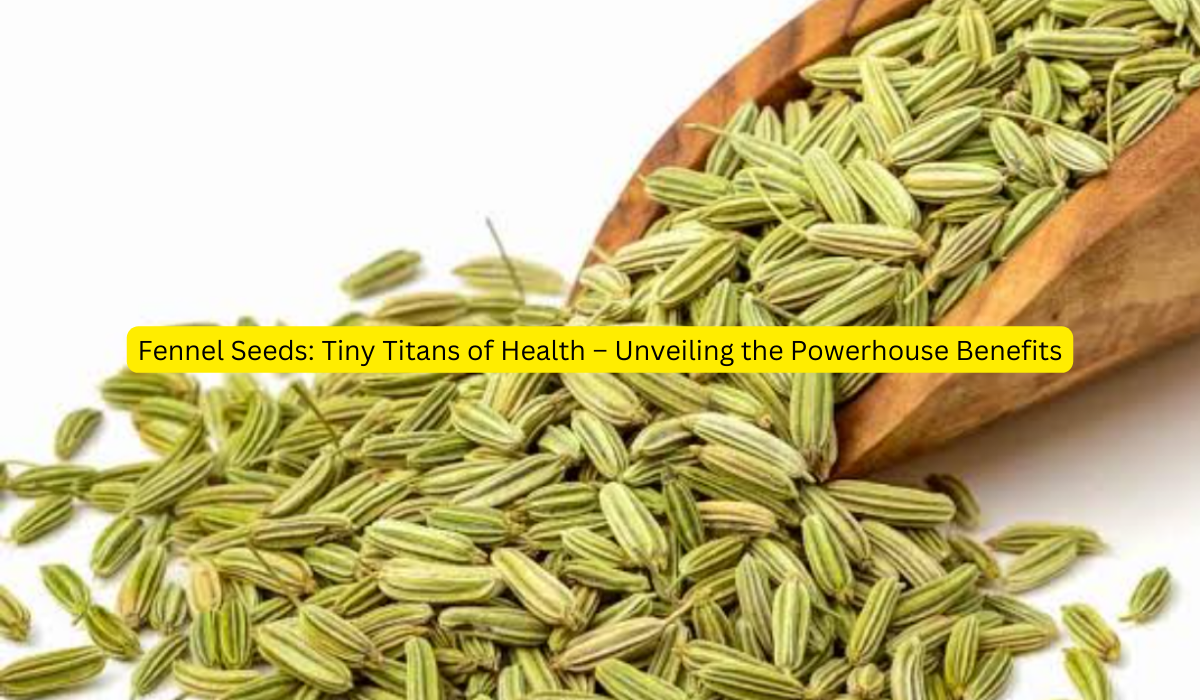Fennel seeds, those tiny, greenish-brown nuggets, might seem unassuming at first glance. But don’t underestimate their power! Fennel seeds boast a long history of culinary and medicinal use, offering a surprising range of potential health benefits. Think of them as tiny treasure chests packed with flavor and wellness potential! Let’s delve deeper into the world of fennel seeds, exploring their nutritional profile, potential health perks, and how you can incorporate them into your diet for a taste of their goodness.
A Nutritional Powerhouse in a Tiny Package
Don’t let their size fool you! Fennel seeds pack a powerful nutritional punch. Here’s a glimpse into some of the key nutrients they offer (per 100g serving):
- Dietary Fiber: 3.2 grams (aids digestion and promotes satiety)
- Manganese: 31% of the Recommended Daily Value (supports enzyme function and metabolism)
- Iron: 19% of the Recommended Daily Value (crucial for red blood cell production)
- Calcium: 12% of the Recommended Daily Value (important for bone health)
- Vitamin C: 17% of the Recommended Daily Value (boosts immunity)
These are just some of the essential nutrients fennel seeds offer. Think of them as tiny nutritional allies supporting your overall well-being!
Important Note: These are percentages based on a 100g serving, which is quite a large amount. You’ll typically consume much less than this in a single serving.
Potential Health Perks of Fennel Seeds
While more research is needed to solidify all the claims, fennel seed consumption has been linked to several potential health benefits:
- Digestive Relief: The presence of dietary fiber in fennel seeds can aid digestion, promote regularity, and potentially alleviate bloating and gas.
- Blood Sugar Management: Fennel seeds might help regulate blood sugar levels, making them a potentially beneficial option for those managing diabetes.
- Reduced Inflammation: Fennel seeds possess anti-inflammatory properties that might be helpful for conditions like arthritis or inflammatory bowel disease.
- Respiratory Support: Fennel seeds have been traditionally used to soothe coughs and ease congestion.
Remember: These are potential benefits, and incorporating fennel seeds into your diet should be part of a balanced approach to health. Always consult a healthcare professional before making significant dietary changes.
Beyond Digestion: Unveiling Fennel Seeds’ Versatility
Fennel seeds aren’t just digestive aids; they offer a unique flavor profile that can enhance various dishes. Here are some ways to incorporate them into your meals:
- Spice Up Your Sauces: Fennel seeds add a subtle licorice-like flavor to tomato sauces, marinades, and salad dressings.
- Flavorful Fennel Tea: Steep fennel seeds in hot water for a soothing and potentially digestive-supporting tea.
- Roasted Vegetables: Toss fennel seeds with vegetables like carrots, potatoes, or Brussels sprouts before roasting for an extra flavor dimension.
- Bread Baking Delight: Fennel seeds add a unique flavor and textural interest to homemade breads.
The key is to experiment! Fennel seeds can be used in various ways, so explore recipes and discover how to incorporate their unique flavor into your culinary creations.
How Much Fennel Seed is Too Much?
Fennel seeds are generally safe for most people in moderate amounts. However, excessive consumption might cause some discomfort like bloating or gas. Start with a small amount and gradually increase as tolerated.
Here’s a tip: Fennel seeds are most flavorful when crushed or ground before use. This releases their essential oils, intensifying their taste and aroma.
Conclusion: Tiny Seeds, Big Potential
Fennel seeds, with their unique flavor profile and potential health benefits, deserve a spot in your kitchen pantry. From aiding digestion to potentially managing blood sugar levels and soothing the respiratory system, these tiny seeds offer a range of potential perks. So, the next time you’re at the grocery store, consider picking up a pack of fennel seeds and explore creative ways to incorporate them into your diet. You might be surprised at the flavor and potential health benefits they offer!
Frequently Asked Questions
1. Are fennel seeds and anise seeds the same?
While both have a licorice-like flavor and similar appearances, fennel seeds and anise seeds are distinct. Fennel seeds are slightly elongated and greenish-brown, while anise seeds are star-shaped and brown. Fennel seeds have a subtler licorice flavor compared to anise seeds, which are more intense and can overpower a dish if not used cautiously.
2. Can fennel seeds be used to freshen breath?
Yes, fennel seeds have traditionally been used as a natural breath freshener. Chewing on a few fennel seeds after a meal might help combat bad breath. However, it’s important to maintain good oral hygiene practices for optimal breath freshness.
3. Are fennel seeds safe for pregnant women?
While generally safe for most people in moderation, pregnant or breastfeeding women should consult their doctor before consuming large quantities of fennel seeds. Some sources advise caution due to potential hormonal effects.
4. Can fennel seeds be used topically for any benefits?
Fennel seed extracts might be used in some topical creams or lotions for their potential anti-inflammatory properties. However, using fennel seeds directly on the skin is not recommended and could cause irritation. Always consult a healthcare professional before using fennel seeds for any topical applications.
5. Where can I find fennel seeds?
Fennel seeds are readily available in most grocery stores, typically found in the spice aisle. You can also find them in some Indian or Asian grocery stores. Look for whole fennel seeds for the best flavor and aroma.

